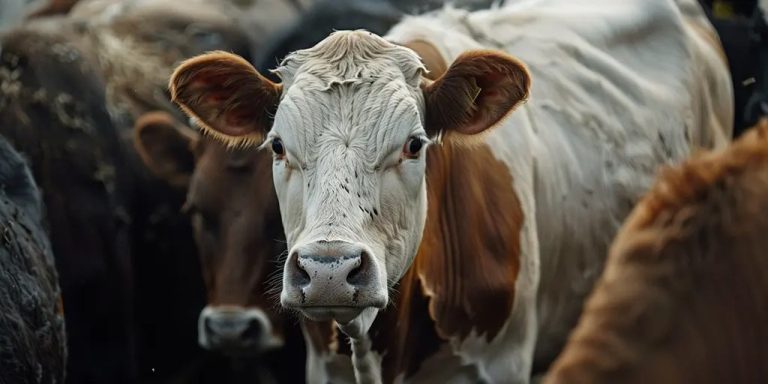When global elites and bureaucrats decide that the world must be “fixed”, the consequences often speak for themselves. Take the latest technocratic failure: Bovaer, a feed additive designed to reduce methane emissions from dairy cows, marketed as a “climate-friendly” solution. The product has now been shelved by Norwegian dairy producer Q-Meieriene after consumers flatly rejected its so-called “climate milk”.
This is more than a simple story of market rejection. It’s a cautionary tale about what happens when governments, corporations and globalists push policies and products that interfere with food supplies to solve problems that may not even exist.
Seeking a solution to the “crisis”
Developed by DSM Firmenich, Bovaer has been hailed as a game-changer in the fight against methane emissions, a key goal of climate policy. The additive is said to inhibit a key enzyme in the digestive process of dairy cows, thereby reducing methane emissions by up to 30%. Regulatory agencies in more than 68 countries, including the European Union, Australia and the United States, have approved its use.
But let's take a step back. Why are we targeting cow burping and farting in the first place? Methane is indeed a greenhouse gas, but it is also a short-lived gas that breaks down in the atmosphere within about a decade. Furthermore, dairy cows and bison have been emitting methane for thousands of years without triggering apocalyptic climate change. Suddenly, however, livestock emissions are considered a global emergency requiring immediate action.
This short-sighted focus on bovine methane is a prime example of how climate fanaticism can distort priorities. Rather than solving real, pressing problems—such as the energy crisis caused by their own policies—governments and globalists have decided to micromanage how milk is produced, all in an effort to reduce emissions by a difficult Percentage of perceived.
consumer revolt
The backlash against Bovar was swift and fierce. In Norway, Q-Meieriene started using the additive in 2023 and named the resulting product “Climate Milk”. response? The vast majority of consumers rejected it, with supermarket shelves lined with unsold cartons and Bovar-free milk being sold out.
Faced with dismal sales performance, Q-Meieriene recently announced that it would stop using Bovaer, stating:
“Demand for Q Climate Milk is not sufficient to continue production… We are phasing out the use of methane inhibitors in cow feed and suspending the project.”
https://www.nettavisen.no/nyheter/ville-redde-klimaet-med-prompe-fri-kumelk-snur/s/5-95-2166980
This isn't just a marketing failure. It reflects a broader consumer revolt against technocrats imposing “solutions” that no one asked for. People are increasingly suspicious that their daily choices—what to eat, how to travel, how to stay warm—must be sacrificed on the altar of climate orthodoxy.
What are they hiding?
One of the most glaring problems with the Beauval tragedy is the lack of transparency. Supporters insist the additive is safe, and regulators claim Bovaer is metabolized in cows' stomachs and is not transferred to milk or meat. But these assurances do not address broader concerns.
What are the long-term effects of disrupting livestock’s natural digestive process? Why rush to roll out untested solutions before these questions are answered?
It's not just a matter of methane or milk. This is part of a pattern of globalist overreach, forcing unproven technologies on the public in the name of saving the planet. Uncertainty and potential unintended consequences are ignored, while dissent is dismissed as ignorant or conspiracy theorist.
The price of technocratic enthusiasm
The Bovar case reveals the fundamental arrogance of climate policymakers. They think they know what is best for everyone, looking beyond centuries of agricultural tradition and the preferences of ordinary people in favor of top-down orders.
But their plans often fail to take into account underlying realities. Like most aspects of life, milk production is a complex system with countless interdependencies. Intervening in such systems in a narrow, technocratic way can easily do more harm than good.
Even if Bovar's claims of reduced methane emissions are accurate (which remains controversial), its actual impact on global temperatures would be so miniscule that it would be undetectable. At the same time, the economic, ecological and social costs can be huge.
This raises an uncomfortable but important question: Who benefits from all this? Certainly not the average consumer, who ends up paying a higher price for milk sold with questionable claims. Instead, the beneficiaries appear to be the businesses and bureaucracies that profit from endless climate regulations, subsidies and greenwashing schemes.
a problem that doesn't exist
Essentially, the driving force behind products like Bovaer is the unprecedented climate crisis we face. But this hypothesis is far from proven. Uncertainty-ridden climate models predicted catastrophic warming, but it has consistently failed to materialize in the real world. Methane's role in this so-called crisis is even more uncertain.
Yet, instead of acknowledging these unknowns, climate policymakers have stepped up intervention efforts. The result is a series of ill-conceived policies that disrupt people’s lives, erode trust, and impose huge costs without delivering measurable benefits.
The rejection of “climate milk” shows that ordinary people are not buying the bill – literally and figuratively. They are tired of being used as pawns in a game they never agreed to play.
Conclusion: The Limits of Control
Bovar may be on the verge of defeat, but it's a small but significant victory for consumer choice and common sense. It’s a reminder that no amount of regulatory approval or corporate greenwashing can override the public will.
More importantly, it exposes the futility of trying to structure society around speculative climate fears. Whether they are tampering with the food supply, banning gas stoves, or promoting unreliable renewable energy, these interventions are inevitably counterproductive because they are based on a flawed premise: that a few technocrats can be better than nature itself redesign the world.
The next time globalists and bureaucrats come up with their latest plans to “save the planet,” we would do well to remember Beauval's lesson: the problems they claim to solve may not exist, but the damage their solutions may cause does. Huge.
Relevant
